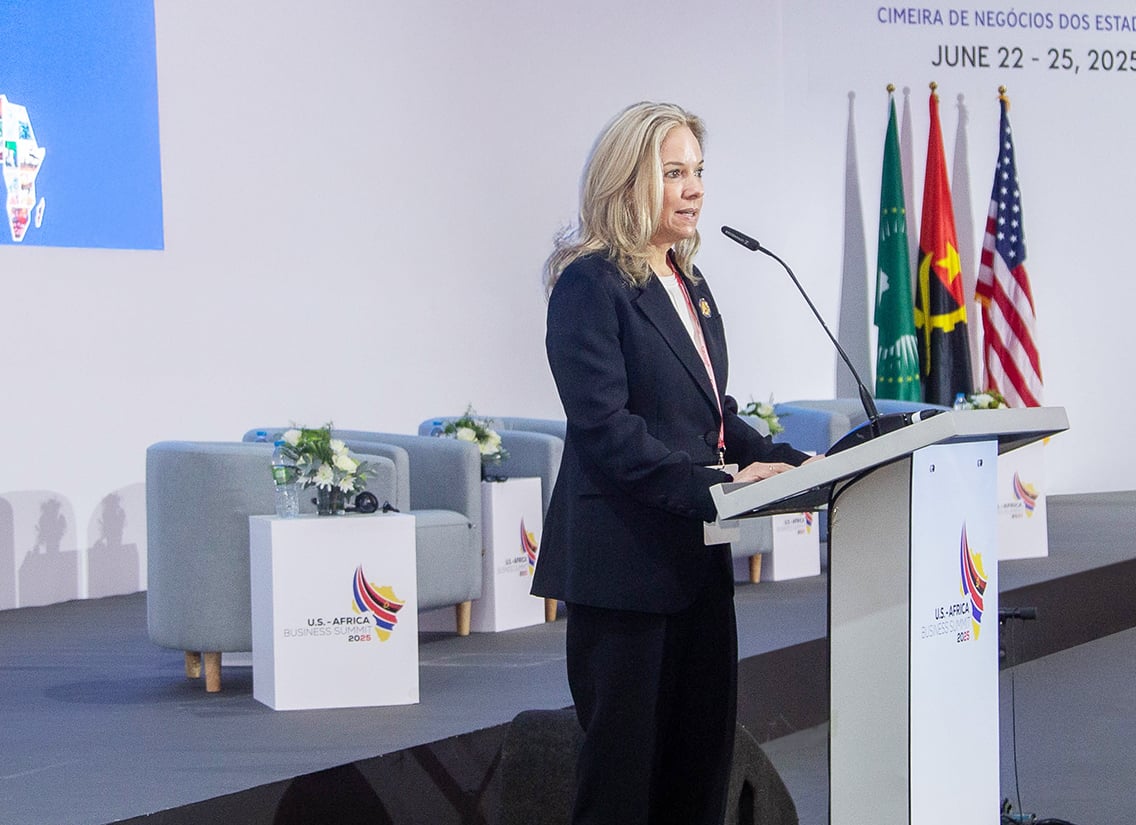This article was produced with the support of Coca-Cola
Ms. Ortega, thank you for speaking with us. The announcement of the Coca-Cola system’s Africa-wide socio-economic impact study at the 2025 US-Africa Business Summit was a significant milestone. Can you tell us more?
Thank you for the invitation. It was an honour to participate in the US-Africa Business Summit, which has become a crucial platform for fostering collaboration and dialogue between African nations and the United States. This summit offered a timely opportunity to share the findings of the socio-economic impact study – a reflection of our enduring presence and support for Africa’s development over the decades.
The Coca-Cola system’s journey in Africa began in 1928. Since then, we’ve grown into a system that operates across Africa, anchored by collaboration with our authorised bottlers, thousands of suppliers, retailers and entrepreneurs. We’re deeply rooted in communities, with a model that creates jobs, strengthens local industries and uplifts communities. We source locally, produce locally and distribute locally, helping to build stronger, more integrated and prosperous economies in Africa, and everywhere we operate around the world. And at the heart of it all is our purpose: to refresh the world and make a difference – a purpose that guides every decision we make.
The last time the Coca-Cola system conducted a continent-wide socio-economic assessment was in 1998 – and much has changed since then.
That’s why we worked with the global consultancy Steward Redqueen to conduct the study. Using advanced modelling tools, Steward Redqueen measured the Coca-Cola system’s impact across sectors and regions in 2024 – giving us a clear view of how we contribute to national and regional development. The approach also integrated client-provided operational data with trusted third-party economic sources and industry benchmarks. More than just measuring direct contributions, the analysis uncovered economic interlinkages – showing how the Coca-Cola system drives production, generates income and supports employment across industries.
What were the key findings from the Coca-Cola system’s Africa-wide socio-economic impact study?
The findings of the study were significant. In 2024, the Coca-Cola system supported more than 1m jobs across its value chain on the continent in sectors like retail, agriculture, manufacturing, transport and services. This included 36,800 direct Coca-Cola system jobs, plus 987,000 indirect jobs that are supported across the value chain, meaning the system collectively supported 27 additional jobs for every job it directly creates.
In the same year, the system contributed $10.4bn in value-added economic activity across its value chain in Africa. Equally important is the scale of our local sourcing. The system also invested $4.3bn in the African economy in 2024 through the purchase of goods and services from local suppliers, representing 83% of its total procurement. These figures are more than just data points – they’re a reflection of our long-standing support for building local economies and creating shared value. They confirm what we’ve always known: the Coca-Cola system’s presence is embedded in African economies.
How are these findings shaping the Coca-Cola system’s approach to making further investments and driving long-term development across Africa?
The study serves as both a validation and a roadmap. It confirms that our business model focused on “localness” works. But there is always more to be done. That’s why we are doubling down, turning insights into action through bold investments that confirm our commitment to the continent.
Last year, the Coca-Cola system announced nearly $1.2bn in investments across Africa over the next five years, and we are hopeful that stable and predictable policy environments will enable more investments in the years ahead. Additionally, the Coca-Cola system is investing $25m by 2030 to help address critical water-related challenges in local communities in 20 African markets to help safeguard vital watersheds and improve access to clean water.
Coca-Cola is known for being a global company operating as a local business. How does this play out across African markets?
The Coca-Cola system is built on a unique model between The Coca-Cola Company group and our network of local authorised bottlers. Together, we form what we call the Coca-Cola system.
For nearly 100 years, this system has been deeply invested in Africa’s people and communities. What makes this model successful is how local it is. We’ve built a business rooted in local relationships, innovation and long-term value creation. It is a legacy we are incredibly proud of, as we have used the power of The Coca-Cola Company brands and our business to make a positive impact across Africa.
Today, we operate across all African markets and territories through a system of nearly 30 authorised bottlers that purchase proprietary concentrate from The Coca-Cola Company group and prepare, package, distribute and sell ready-to-drink beverages. Our authorised bottlers work with thousands of suppliers, distributors and wholesalers, enabling us to produce and deliver beverages in a way that is truly integrated with the local economy.
For example, if you buy a Coca-Cola in Casablanca, Nairobi, or Cape Town, chances are that it was prepared by local employees in a local bottling facility, using ingredients and packaging sourced locally, and distributed by a local retailer. This approach creates a ripple effect across the economy. It supports jobs, empowers entrepreneurship and strengthens local supply chains. It also allows us to scale with agility while remaining anchored in local economies.
Looking ahead, what message do you have about the future of the Coca-Cola system in Africa?
As we look to the future, one truth is clear: Africa’s growth is our growth. The Coca-Cola system believes in Africa and in Africa’s future. For nearly a century, we’ve not only operated across the continent, but we’ve also participated in and actively supported its growth.
Ultimately, we cannot do this alone. It will take all of us – governments, civil society, the private sector and development partners – to shape the future together. Collaboration is essential to unlock the full potential of Africa’s growth story.




